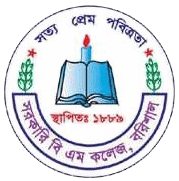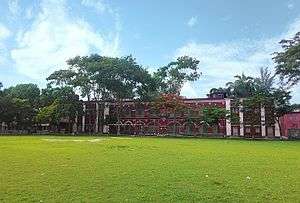Brojomohun College
Govt. Brojomohun College, Barisal[1] (also BM College), is one of the oldest institutions of higher education in Bangladesh. It is located in the city of Barisal in south-western Bangladesh.[2]
ব্রজমোহন কলেজ | |
 | |
| Motto | সত্য, প্রেম ও পবিত্রতা |
|---|---|
Motto in English | Truth, Love and Purity |
| Type | University college |
| Established | 1889 |
| Affiliation | Bangladesh National University |
| Principal | Shafiqur Rahman Sikder |
| Students | 30000+ |
| Location | , Bangladesh 22.7121°N 90.3551°E |
| Campus | Urban (60 acres) |
| Website | bmcollege |
History
On June 14, 1889, Aswini Kumar Dutta founded Brojo Mohan College, which was named after his father, Brajamohan Dutta.[2]
The first principal of the college was Babu Gyan Chandra Chowdhury. While Ashwini Kumar Dutta taught English and logic, Kali Prasanna Ghosh taught history and Kamini Kumar BidyaRatna taught Sanskrit and Bengali. In 1898, BM College was transformed into a "First Grade College" from a "Second Grade College". In 1912, the college went to government management from personal management strategy. From 1889 to 1917 the activities of the college took place on the BM School campus. The college was relocated to its own present complex in 1917.
BM College, affiliated to Calcutta University, started honours course in English and philosophy in 1922, in Sanskrit and mathematics in 1925, in chemistry in 1928, and finally in economics in 1929. The time from 1922 to 1948 is called the "Golden Period" of the college. The governor of Bengal at that time, Sir Udbarn, once commented on BM College, "The college promises some day to challenge the supremacy of the metropolitan (Presidency) College."
After the partition of India and Pakistan in 1947, the college lacked teachers and the student body fell to one third of its post-war size. This made it difficult to teach the same numbers of courses and as a result the two year Honors curriculum conducted by Calcutta University was replaced with the three Honors curriculum of Dhaka University. As a consequence, Honors courses except Mathematics were abolished in 1950. In 1952, Honors in mathematics had also been discontinued. In 1964, Honors in economics restarted. Several other Honors and Masters Courses started between 1972 and 2005.
The time since 1965 has been called the "Age of Enrichment" of the college. Former principal Mohammad Hanif is called the "Architect of Modern Brojo Mohun College". There are 20 degree (pass) courses, 18 Honors courses and 19 Masters courses at BM College. The HSC course was abolished in 1999.
Academic departments

The university has 22 departments under 4 faculties. The faculties are:
Faculty of Arts
- Department of Bangla
- Department of English
- Department of History
- Department of Philosophy
- Department of Islamic Studies
- Department of Islamic History and Culture
- Department of Sanskrit
Faculty of Business Studies
- Department of Finance & Banking
- Department of Accounting and Information System (AIS)
- Department of Marketing
- Department of Management
Faculty of Science
- Department of Botany
- Department of Chemistry
- Department of Mathematics
- Department of Physics
- Department of Soil Science
- Department of Statistics
- Department of Zoology
Faculty of Social Sciences
- Department of Economics
- Department of Sociology
- Department of Political Science
- Department of Social Work
Notable alumni
- Bir Sreshtho Mohiuddin Jahangir, awarded the highest recognition of bravery in the Bangladesh Army
- Jibanananda Das, poet
- Altaf Mahmud, musician, cultural activist and martyred freedom fighter
- Narayan Gangopadhyay, South Asian author
- Swadesh Bose, Bangladeshi economist and organiser of the Liberation War
- Ahsan Habib, poet and writer
Notable faculty members
- Jibanananda Das, taught English
- Mohammad Hanif, architect of modern Brojomohun College
References
- "Govt. BM College at a Glance". bmcollege.gov.bd. Retrieved 2018-10-23.
- Molla, Md Tuhin (2012). "Brajamohan College". In Islam, Sirajul; Jamal, Ahmed A. (eds.). Banglapedia: National Encyclopedia of Bangladesh (Second ed.). Asiatic Society of Bangladesh.